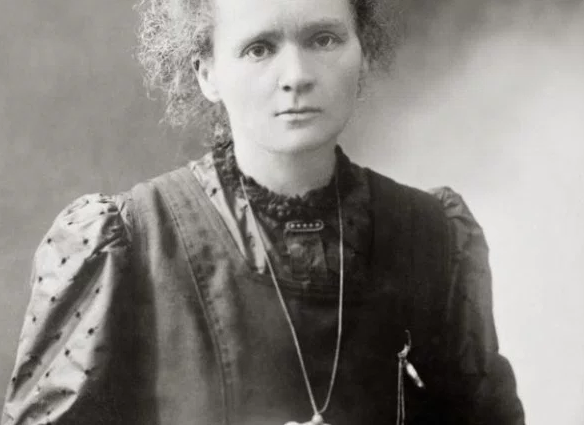
Marie Sklodowska, growing up in Poland, and working in what is then believed to be a ‘proper’ woman’s job – as a governess – secretly studies chemistry, and goes on to earn a doctorate in science, a degree previously never completed by a woman.
Prior to commencing her doctoral studies, she married Pierre Curie, a professor at the Paris Municipal School. Pierre’s father, a retired physician, had moved in with the Curies, to care for their first daughter, Irene.
Then, from a storeroom in her husband’s school, which she converted to a laboratory, Curie began to pursue the largely ignored work of French physicist Henri Becquerel on the rays given off by uranium. Others were pursuing the “X-rays” then newly discovered by Wilhelm Roentgen, and Curie’s work, like her self-made laboratory were far from mainstream.
Curie went on to discover the concept of ‘radioactivity’ (and coined the term itself),
and a new fiercely radioactive substance in pitchblende, discovering 2 new elements “radium” (from the Latin word for ray), and “Polonium” (in honor of her native land, Poland).
The Curies, even working as a team, hadn’t separated enough to see or weigh the new elements, but had sought to prove their existence from the radioactivity given off. When skeptical scientists distrusted the Curies’ findings the laboratory was moved from the storeroom at Pierre’s school to a nearby abandoned shed, and through day and night labor, they ultimately separated enough to definitively prove the elements existed.
In 1903 Marie Curie, along with Pierre Curie and Henri Becquerel, were awarded the Noble Prize in Physics “in recognition of the extraordinary services they have rendered by their joint researches on the radiation phenomena discovered by Professor Henri Becquerel.”
Curie became the first woman to win a Nobel Prize.
Eight years later, in 1911, Curie was awarded a second Nobel Prize, the Nobel Prize in Chemistry, “in recognition of her services to the advancement of chemistry by the discovery of the elements radium and polonium, by the isolation of radium and the study of the nature and compounds of this remarkable element”.
Marie Curie, long before ‘feminism’ was popularly conceived of, established definitively that geekiness is gender-neutral.
Moreover, her work not only gave the world revolutionary new substances for medical treatment, but the first watches that glow in the dark.

